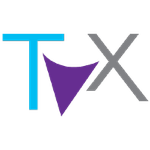Screening for mental health issues from sleep data using AI - TRI Phase 2 trial results imminent
Disclosure: S3 Consortium Pty Ltd (the Company) and Associated Entities own 18,820,000 TRI shares at the time of publishing this article. The Company has been engaged by TRI to share our commentary on the progress of our Investment in TRI over time.
Our Investment TrivarX (ASX:TRI) has just announced completion of their Phase 2 trial.
...and the trial results are “imminent”.
We take this to mean that the TRI’s Phase 2 Trial results could be announced any day now....
TRI’s technology screens for mental health issues like depression by analysing a patient’s sleep data...
Using artificial intelligence (AI).
(TRI have been developing this AI tech for almost a decade, not just jumping on the red hot AI bandwagon recently)
The upcoming Phase 2 trial results could be a major share price catalyst for ~$11M capped TRI.
Beyond the imminent trial results, TRI is having on-going meetings with the US FDA to gain regulatory approval via a defined pathway.
US FDA clearance of TRI’s product would be another big catalyst for this company.
(and we’ll get to the even bigger blue sky for TRI if this particular trial is successful in a second)
This Phase 2 trial is testing across sleep data for 400 patients to see if TRI’s AI algorithm can screen for current major depressive episodes at a better accuracy than other methods.
The current way to screen and monitor treatment for depression is a basic questionnaire which was developed in the 1990s.
There is no doubt the questionnaire would have been put together by some clever minds but it has less than a 50% chance of correctly identifying a person with depression.
TRI is looking to improve on this and has developed an AI powered algorithm to screen for mental health disorders by analysing a patient's sleep data.
With the 400 patient recruitment now complete, the upcoming results of the Phase 2 trial could be a key catalyst for the company.
...depending on the results.
Accurately screening for depression has a huge market in itself.
The blue sky for TRI here is that IF it turns out that sleep data CAN successfully be analysed by its AI to screen for depression, it is likely able to screen for OTHER mental health conditions too.
(like anxiety, PTSD, bipolar, alzheimer's, etc - all huge markets on their own)
And then down the track, TRI’s AI could be refined to potentially be integrated into wearables like a Fitbit, Apple Watch or Oura Ring that all track simplified sleep data.
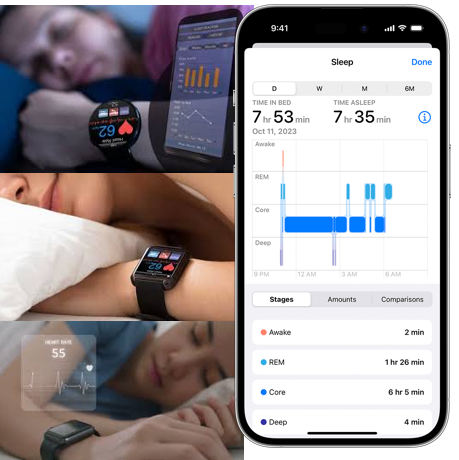
Imagine getting your step count for the day, your sleep quality data AND an early warning to take some action on a potential mental health condition that may be creeping up.
That’s the “blue sky” upside for our Investment in TRI.
But the first step is to wait for the TRI Phase 2 clinical trial results on screening for depression, which could be released any day now...
(this morning TRI announced to expect these results “imminently”)
Previous results published by TRI show that TRI’s screening algorithm has a better ability to test for patients with the disorder (in this case Major Depressive Episodes), but is marginally worse in designating individuals who don’t have the disease.
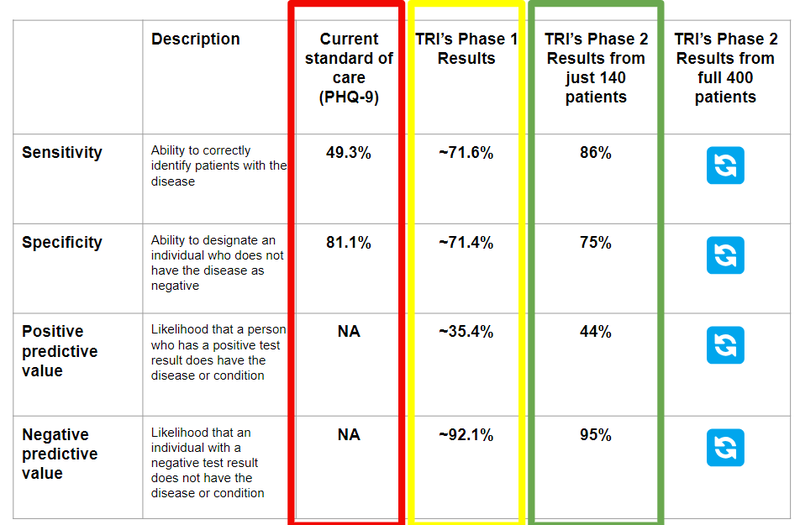
With these upcoming trial results, the “bull case” we would love to see is for TRI to improve on the standard of care in both Sensitivity AND Specificity.
So, how does TRI’s technology work?
TRI’s technology works by evaluating a person’s brain waves and heart rate while they sleep to evaluate whether identifiable patterns exist that indicate a person has depression.
These patterns are also known as “biomarkers”.
Biomarkers are the holy grail for screening, as it is physiological evidence that can be used to confirm the presence of a disease or ailment.
(as opposed to “patient surveys” about “how you feel” that are currently used in mental health)
TRI has been developing their AI technology for almost 10 years now.
Basically TRI’s AI algorithm is finding patterns in brain waves and heart rate that match up with those found in actually depressed patients
This AI has been in development way before AI went mainstream last year.
TRI’s Chief Medical Officer, Dr. Archie Defillo and Head of AI Dr Massimilano Grassi have been working together on progressing TRI’s depression screening technology since 2019.
These guys are the brains behind TRI’s technology, a specially designed algorithm, and continue to progress it.
TRI’s algorithm is particularly focussed on the connection between the readings from the electroencephalogram (brain waves - EEG) and the electrocardiogram (heart rate - ECG) which enables the technology to map the connectivity between brain and heart activity throughout sleep stages.
TRI’s Chief Medical Officer, Dr. Archie Defillo says in his presentations that he believes “Sleep is the window into mental health”.
And soon we may have the data to prove this connection using AI.
For us, this is the type of genuine, well developed AI technology that made TRI attractive to us as an Investment.
Over the last 10 years the company has had multiple attempts to get approval from the FDA.
Each time, TRI was knocked back and more data was requested.
(also the previous management bungled a few of the applications, hence why the share price had been on slow downtrend. We Invested in the most recent ‘recap raise’ hoping that the new management could turnaround the company).
The goal of this Phase 2 clinical trial (results are now “imminent”) is to provide TRI with enough data to get approval from the FDA and ultimately commercialise its product.
There have been some recent changes to the FDA’s attitude towards algorithm based screening tools that we think bode for TRI and its prospects of FDA approval.
Since 2007, approvals for AI algorithms have grown dramatically, with over 200 approvals granted in 2021/2022.
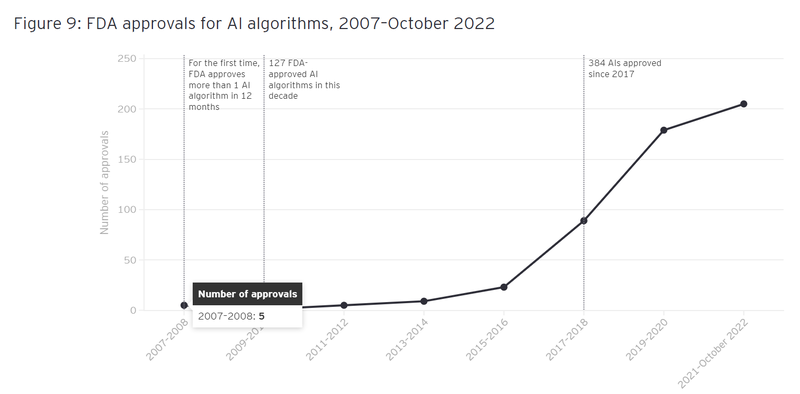
(Source)
In 2020 the FDA launched a program to support unconventional drug development tools that don’t fit into the existing route for evaluation.
As recently as this year the FDA accepted an AI-generated Clinical Outcome Assessment tool into the program.
The tool uses behavioural signal processing to evaluate symptoms of anxiety and depression and is the first AI-based digital health technology project in neuroscience to be accepted into the program.
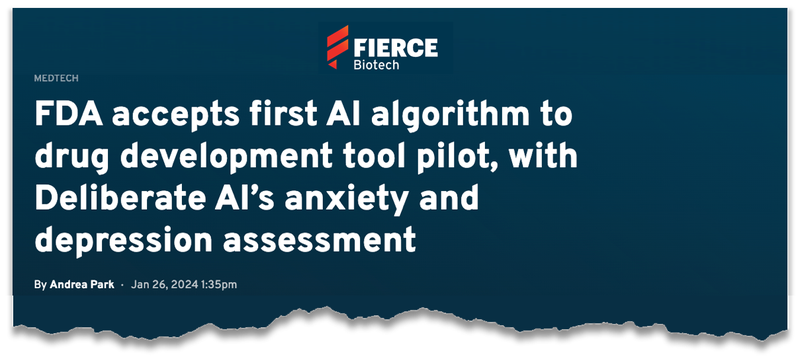
(Source)
This is a very important decision for TRI as it shows a growth in the FDA’s attitude towards AI-based tools for use in medical screening and monitoring for mental health conditions.
Ultimately, the biggest challenge that TRI has faced over the last ten years is finding the right pathway for FDA approval in the US.
The FDA is the ultimate gatekeeper before TRI’s technology can be taken to market and TRI has worked for years trying to get through the approvals pathway.
It is clear from the Phase 1 trial that TRI’s product is superior relative to the standard of care (those questionnaires that are used), however to get the product through to commercialisation it will need data to satisfy the FDA...
Which is growing more and more amenable to AI-based screening and monitoring tools as time goes on.
This brings us to our big bet:
Our TRI Big Bet:
“TRI re-rates to a $250M plus market cap on successful clinical trial results for screening one or more mental health disorders, FDA approval and/or is acquired for multiples of our Initial Entry Price”
NOTE: our “Big Bet” is what we HOPE the ultimate success scenario looks like for this particular Investment over the long term (3+ years). There is a lot of work to be done, many risks involved - just some of which we list in our TRI Investment memo. Success will require a significant amount of luck. There is no guarantee that our Big Bet will ever come true. NOTE: FDA approval added to big bet 10 July 2024.
What do we want to see from the Phase 2 results?
The purpose of running a Phase 2 trial is to gather enough data for the FDA to approve and register TRI’s product for commercial use.
Ultimately, we want to see TRI publish results that are equal to or better than the Phase 1 trial which was conducted in 140 patients.
So we’ve set up our bull/bear/base cases for the TRI results as follows:
Patients in TRI’s trial are monitored for sleep patterns in a physical location called a sleep clinic.
TRI’s algorithm will evaluate the sleep data from these patients to identify patterns of brain activity and heart rate to identify signs of depression.
(it is quite sci-fi stuff, but if you want to hear the founder talk more about the science watch this video)
In close proximity to collecting the sleep data the patient will undertake a Mini-International Neuropsychiatric Interview (also known as a MINI).
This is a well accepted way of diagnosing clinical depression.
TRI’s diagnosis is then evaluated against the results of the MINI to evaluate how accurate TRI’s program is at screening for depression.
The closer that TRI’s results are to the results of a MINI, the better the program.
The current standard of care for screening for depression is through a questionnaire:
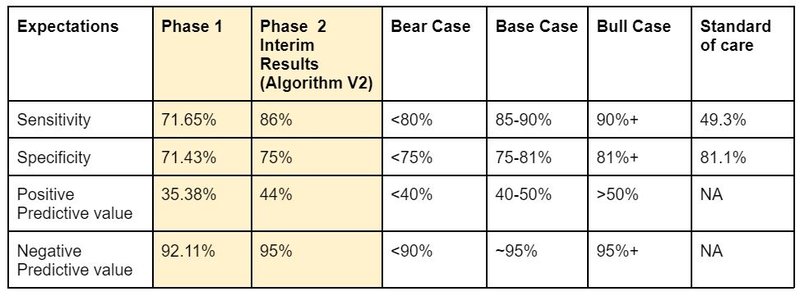
Patients in TRI’s trial are monitored for sleep patterns in a physical location called a sleep clinic.
TRI’s algorithm will evaluate the sleep data from these patients to identify patterns of brain activity and heart rate to identify signs of depression.
(it is quite sci-fi stuff, but if you want to hear the founder talk more about the science watch this video)
In close proximity to collecting the sleep data the patient will undertake a Mini-International Neuropsychiatric Interview (also known as a MINI).
This is a well accepted way of diagnosing clinical depression.
TRI’s diagnosis is then evaluated against the results of the MINI to evaluate how accurate TRI’s program is at screening for depression.
The closer that TRI’s results are to the results of a MINI, the better the program.
The current standard of care for screening for depression is through a questionnaire:
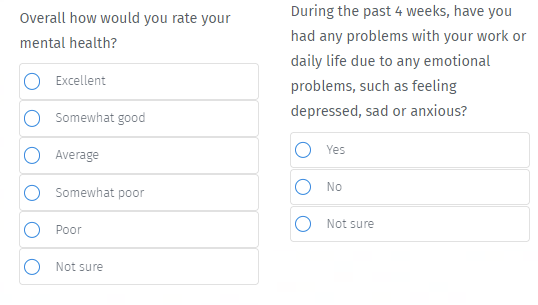
These questionnaires were developed in the 1990s and are still being used today as the current standard of care.
The “Sensitivity” score for a questionnaire like this is 49.3%.
This means that only around 50% of the time that someone answers this questionnaire they will be correctly identified as having depression.
Ultimately we want to see TRI significantly improve upon the current standard of care as it will go a long way towards marketing approvals from the FDA.
What would success look like for TRI in the long run?
We think TRI can follow a similar trajectory to one of the great ASX medtech success stories - ResApp.
ResApp developed a diagnostic tool that could detect and identify various respiratory conditions based on the sound of a cough made into a smartphone microphone using an algorithm.
ResApp began life as a University of Queensland based start up - and did a backdoor listing in 2015 when the share price was sitting at a market cap of ~$11M and had a share price of ~2c.
7 years later in 2022 the now US$224BN capped Pfizer acquired ResApp for ~$180M at a share price of 20.8c:
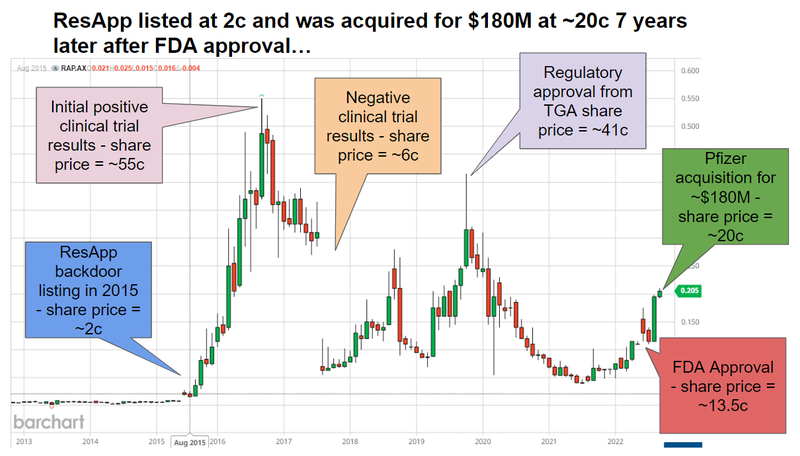
The past performance is not and should not be taken as an indication of future performance. Caution should be exercised in assessing past performance. This product, like all other financial products, is subject to market forces and unpredictable events that may adversely affect future performance.
ResApp went through a couple waves of strong sentiment, before it was ultimately acquired at a nearly 1,000% share price premium to the entry price for investors that backed the company when it backdoor listed.
We are Investing in TRI to hopefully see it achieve similar success by first validating its technology in clinical trials, getting regulatory approvals and then eventually commercialising the tech.
Eventually if TRI can kick enough goals it could make itself a takeover target for a larger pharma company.
Right now TRI does not have a CEO, and we want to see the company implement a gun CEO to deliver a commercial strategy for this innovative product.
How today’s news impacts our TRI Investment Memo:
One of the key reasons we Invested in TRI is because it had a near-term share price catalyst - results of the phase 2 trial.
With recruitment completed, we think that it will be a matter of weeks before TRI publishes these results.
If the results exceed our Bull Case expectations we hope that the share price will reflect this development.
Investment Thesis #4 - Imminent Phase 2 clinical trial results
400 patients' sleep data is being screened for depression using TRI.
IF the trial result is positive, it could open the door to US FDA regulatory approvals and potentially even training the AI algorithm to screen for other types of mental health issues too.
The final results are expected in the next couple of months. We think they will be a catalyst for TRI’s share price.
Source: “Reasons We Invested” section - TRI Investment Memo 2 May 2024
Objective #1: Complete Phase 2 clinical trial, release results
TRI is currently conducting a Phase 2 trial in the US on its algorithm for detecting current Major Depressive Episode (cMDE). Final results are expected in the June quarter (before July 1st 2024).
Milestones
✅ Complete recruitment of 400 patients [Complete Today]
🔄 Phase 2 clinical trial results
🔲 Potential additional clinical validation studies
Source: “Objectives” section - TRI Investment Memo 2 May 2024
A reminder, why we are Invested in TRI:
- Screening for mental health conditions from sleep data - novel solution to a serious problem. Current methods to screen for mental health are subjective and inaccurate, resulting in patients not receiving the right treatment. TRI is using AI to analyse sleep data to provide objective, accurate screening for mental health conditions.
- Genuine AI (Artificial Intelligence) exposure - TRI didn’t just start working with AI once it became a popular investment thematic in recent months. TRI has a Head of AI, Dr Massimiliano Grassi, who has been doing AI for psychiatry for at least 6 years. TRI’s algorithm has advanced to Phase 2 trials and is getting better as time passes and more data is collected.
- ~$11M market cap - undervalued and unloved Medtech? - like our successful Investment in Oneview, our view is that TRI is undervalued at ~$11M considering the 9 years of investment into its tech & with a Phase 2 trial being run. We think this is a great entry after years of hard work with the right team to take TRI forward now in place.
- Imminent Phase 2 clinical trial results - 400 patients sleep data is being screened for depression using TRI. IF the trial result is positive, it could open the door to US FDA regulatory approvals and potentially even training the AI algorithm to screen for other types of mental health conditions too. The final results are expected in the next couple of months. We think they will be a catalyst for TRI’s share price.
- Path to FDA approval - TRI has engaged with the FDA and the “De Novo” pathway was defined by the regulator, a type of FDA approval which is generally longer and more rigorous but reserved for genuinely new medical devices, which we think TRI’s algorithm is.
- USA based story and market - TRI has a US-based tech team and is going for the lucrative US healthcare market - which is the huge, clearly trodden pathway for big exits in biotech/medtech.
- Near term revenue opportunities (Stager) - US$15BN market - Commercial roll-out of TRI’s sleep staging software for sleep clinics - commercialisation is underway with licensing agreements and partnerships anticipated 2024. TRI’s novel products are aimed at sleep research organisations in the US, targeting the US$15 billion sleep medicine market.
- Proven new management team with key backers - recently appointed board and management team with significant success in US and global healthcare markets, including founding directors/financiers of Race Oncology ($600m+ market cap 2021) and ResApp Health, which Pfizer ended up taking over for ~$180M in 2022.
- Long term technical team retained (AI experts and human brain experts) - Neurosurgeon Dr Defillo and AI specialist Dr Grassi are the brains behind TRI’s tech - they’ve been involved together since 2019 and both bring a special skill set that we think will drive TRI’s success.
- Major shareholder is Fidelity Investments - one of the largest fund managers in the U.S, is the #1 shareholder in TRI with a ~10% holding in the company.
- Potential to screen for other psychiatric disorders - if it turns out that sleep data CAN successfully be analysed by its AI to screen for depression, it is possible that the AI can be trained to screen for OTHER mental health conditions too.
- Potential to integrate TRI’s tech into wearables - TRI’s tech may potentially be integrated into wearables like a Fitbit, Apple Watch or Oura Ring that all track simplified sleep data. That’s a big commercial opportunity in our eyes.
Source: TRI Investment Memo 2 May 20224
What could go wrong?
Clinical trial risk
Clinical trial outcomes are never certain - TRI might not be able to generate results good enough for the regulator to approve the product.
Clinical trials, even low cost ones, require capital in order to be conducted. A clinical validation study, which TRI may also have to complete could cost additional money.
Source: “Risks” section - TRI Investment Memo 2 May 2024
In the short term the key risk hanging over the stock is around the company’s clinical trial results.
TRI has now enrolled all 400 patients as part of its phase 2 trial and expects to put out results from the trial in the coming weeks.
If the results are poor then the market will price in the results by sending TRI’s share price lower regardless of TRI’s forward plan with its technology.
To see more risks against our Investment Thesis check out our TRI Investment Memo.
Our TRI Investment Memo
You can read our Investment Memo in the link below.
This memo provides a short, high-level summary of our reasons for Investing.We use this memo to track the progress of all our Investments over time.
In our TRI Investment Memo, you can find the following:
- What does TRI do?
- The macro theme for TRI
- Our TRI Big Bet
- What we want to see TRI achieve
- Why we are Invested in TRI
- The key risks to our Investment Thesis
- Our Investment Plan
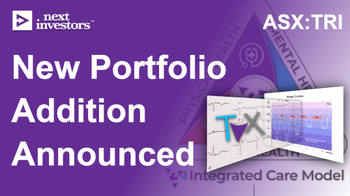
General Information Only
This material has been prepared by StocksDigital. StocksDigital is an authorised representative (CAR 000433913) of 62 Consulting Pty Limited (ABN 88 664 809 303) (AFSL 548573).
This material is general advice only and is not an offer for the purchase or sale of any financial product or service. The material is not intended to provide you with personal financial or tax advice and does not take into account your personal objectives, financial situation or needs. Although we believe that the material is correct, no warranty of accuracy, reliability or completeness is given, except for liability under statute which cannot be excluded. Please note that past performance may not be indicative of future performance and that no guarantee of performance, the return of capital or a particular rate of return is given by 62C, StocksDigital, any of their related body corporates or any other person. To the maximum extent possible, 62C, StocksDigital, their related body corporates or any other person do not accept any liability for any statement in this material.
Conflicts of Interest Notice
S3 and its associated entities may hold investments in companies featured in its articles, including through being paid in the securities of the companies we provide commentary on. We disclose the securities held in relation to a particular company that we provide commentary on. Refer to our Disclosure Policy for information on our self-imposed trading blackouts, hold conditions and de-risking (sell conditions) which seek to mitigate against any potential conflicts of interest.
Publication Notice and Disclaimer
The information contained in this article is current as at the publication date. At the time of publishing, the information contained in this article is based on sources which are available in the public domain that we consider to be reliable, and our own analysis of those sources. The views of the author may not reflect the views of the AFSL holder. Any decision by you to purchase securities in the companies featured in this article should be done so after you have sought your own independent professional advice regarding this information and made your own inquiries as to the validity of any information in this article.
Any forward-looking statements contained in this article are not guarantees or predictions of future performance, and involve known and unknown risks, uncertainties and other factors, many of which are beyond our control, and which may cause actual results or performance of companies featured to differ materially from those expressed in the statements contained in this article. S3 cannot and does not give any assurance that the results or performance expressed or implied by any forward-looking statements contained in this article will actually occur and readers are cautioned not to put undue reliance on forward-looking statements.
This article may include references to our past investing performance. Past performance is not a reliable indicator of our future investing performance.

